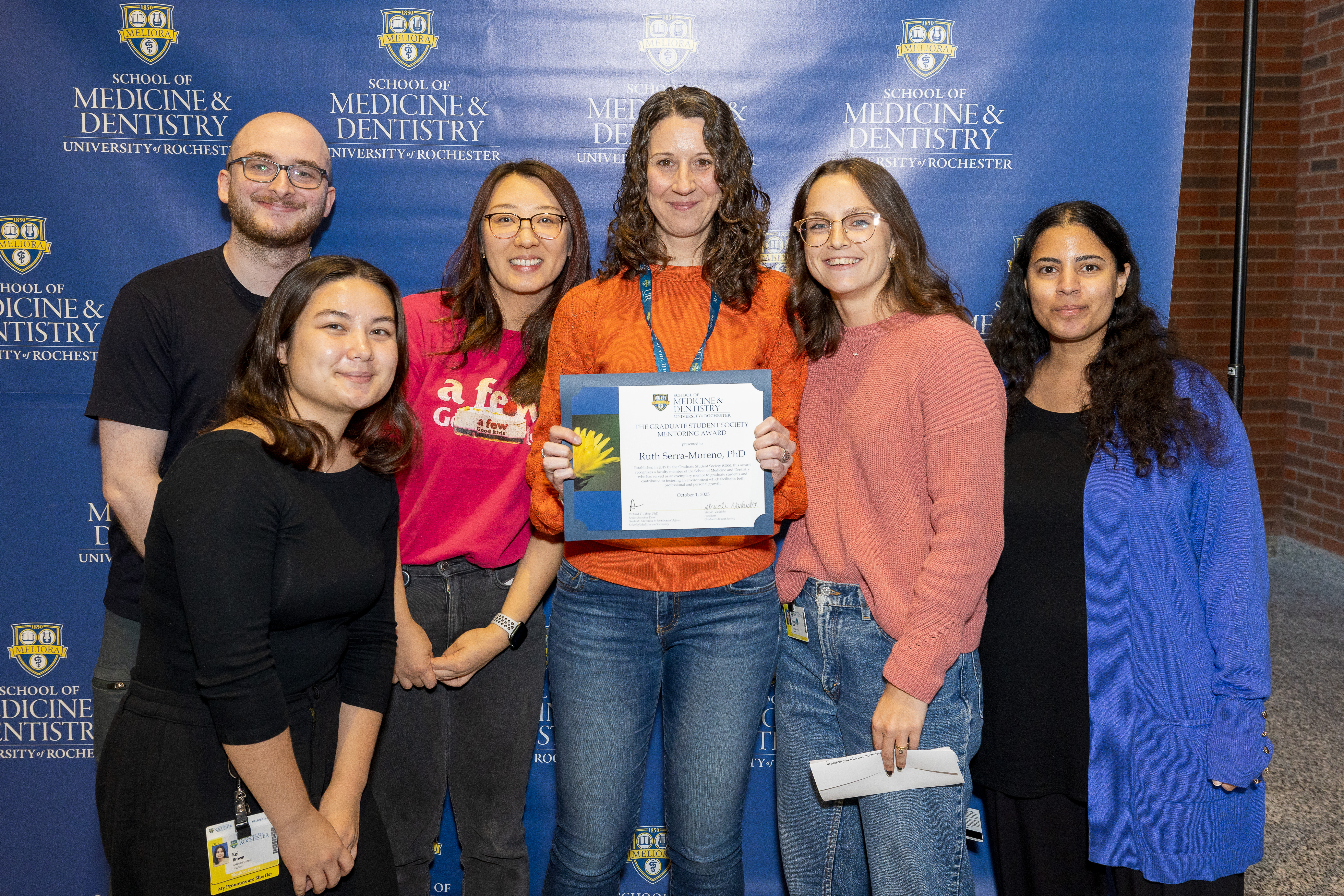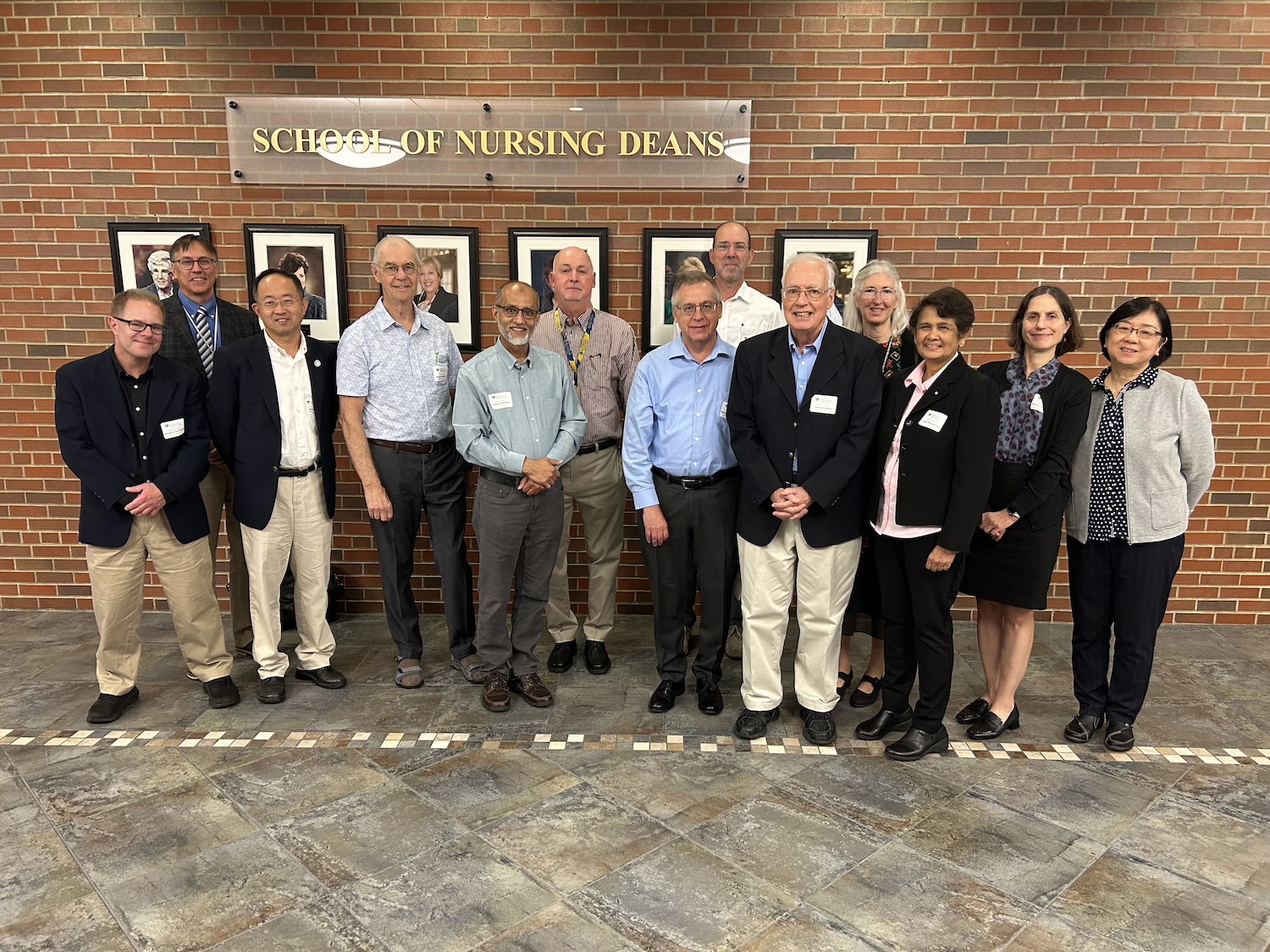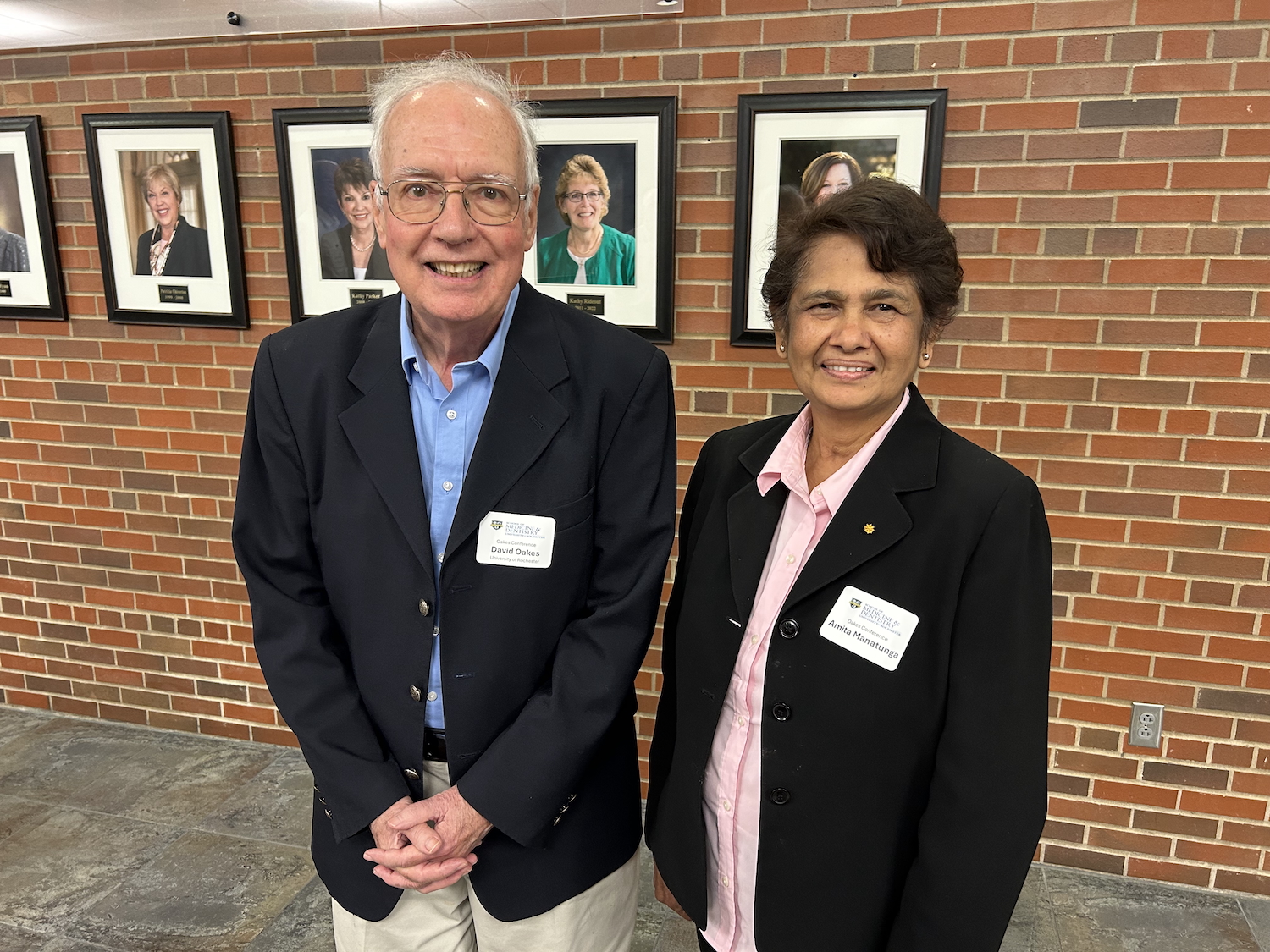Research Education News
The New Issue of Opportunities to Explore is Out Now!
Monday, December 8, 2025
Read the December 8-12, 2025 Issue
Where Research and Mentorship Shine: Highlights from the 2025 GEPA Awards
Monday, October 6, 2025

with members of the Graduate Student Society after receiving the GSS Mentoring Award.
Each year, the School of Medicine & Dentistry’s Office for Graduate Education and Postdoctoral Affairs honors the people who advance discovery and inspire others to do the same. The 2025 GEPA Awards Ceremony, held on October 1, recognized outstanding contributions in research and mentorship across our research community.
Below is the full list of awardees.
GEPA Awards 2025
Faculty Awards
| Award | Recipient |
|---|---|
| Excellence in Postdoctoral Mentoring | Mohammad Mehrmohammadi, PhD |
| Outstanding Graduate Program Director | Christopher Seplaki, PhD |
Postdoc Awards
| Award | Recipient |
|---|---|
| Outstanding Postdoc Mentor | Erin Davis, PhD |
| Outstanding Postdoc Researcher | Sonali Sharma, PhD |
| Community Impact & Advocacy Postdoc Award | Kathryn Toffolo, PhD |
Graduate Student Awards
| Award | Recipient |
|---|---|
| Graduate Alumni Fellowship | Jessica Fiser, Neuroscience |
| Community Impact & Advocacy Graduate Student Award | Sophie Troyer, Microbiology and Immunology |
| Irving L. Spar Fellowship | Catrin Zharyy, Neuroscience |
| J. Newell Stannard Scholarship | Jiwon Choi, Neuroscience |
| Merritt and Marjorie Cleveland Fellowship | Jessica Ogu, Neuroscience |
| Outstanding Student Mentor | Michael Giannetto, Neuroscience |
GSS Awards
| Award | Recipient |
|---|---|
| GSS Advocacy Award | Richard Libby, PhD |
| GSS Mentoring Award | Ruth Serra-Moreno, PhD |
| GSS Recognition Award | Leah Brown |
T32 Award
| Recipient |
|---|
| Mike McDermott, PhD |
| Robert Holloway, M.D., M.P.H. |
Fellowships & Scholarships
| Award | Recipient |
|---|---|
| Provost Fellowship | Jonathan Williams, Neuroscience |
| Provost Fellowship | Penelope Pando, Toxicology |
| Meliora Scholarship | Hiba Ahmed, Epidemiology |
| Meliora Scholarship | Jessica Ogu, Neuroscience |
| Meliora Scholarship | Jihad Gadsden, Pathology |
| Meliora Scholarship | Rosebell Onuma, Toxicology |
Celebrating the Legacy of David Oakes, PhD
Friday, October 3, 2025


Last month, colleagues, collaborators, and former mentees from near and far came together to honor a scholar, mentor, and colleague whose impact has been felt across generations: David Oakes, PhD, Professor Emeritus of Biostatistics and Computational Biology.
For more than four decades, David’s work has advanced both science and people. His pioneering contributions to survival analysis have shaped the way we understand clinical trials and patient outcomes, and his collaborations with neurologists, cardiologists, and environmental health researchers have directly influenced new FDA-approved therapies.
But what stood out most at his retirement celebration were the stories of mentorship and humanity.
Steve Dewhurst, Vice Dean for Research, reflected on how David’s career has been defined not only by impactful science but also by the collaboration that made it possible.
“What makes you special is the collaboration you’ve done in your career,” he said. “Your work has led to FDA therapeutics. And the mentorship you’ve provided—former trainees speak so highly of you. You’ve built a true legacy.”
Amita Manatunga, Professor of Biostatistics and Bioinformatics at Emory University, and David’s first PhD student in the U.S., recalled his thoughtfulness as both a mentor and a person. She described him as “a true British gentleman, straight out of Masterpiece Theatre.” Soft-spoken but deliberate, “every comment mattered.”
She shared a story of when her son was born at Strong Memorial Hospital on the very day her dissertation proposal was due. David visited her and reassured her that presenting could wait. “He was the first guest my son ever saw,” she said. “David truly launched my career, and I will always be grateful for the start he gave me.”
In his own remarks, David showed his trademark wit. “Of course I did it all by myself,” he said before humbly crediting mentors such as Sir David Cox, as well as longtime colleagues Ira Shoulson and Arthur Moss for shaping his path.
University of Rochester Medical Center CEO and SMD Dean David Linehan, MD, wrote in his tribute, “Your impact, particularly in shaping what is now the Department of Biostatistics and Computational Biology, is truly immeasurable. Your groundbreaking work has led to advances in the treatment of cancer, cardiovascular disease, and neurological disorders, benefiting the scientific community and patients around the world.”
David leaves behind not only a body of scholarship but also a legacy of people, ideas, and collaborations that will continue to thrive.
Please join us in congratulating Dr. Oakes on a remarkable career and wishing him joy in his retirement.
Building the Blueprint: SMD Graduates Its First Genetic Counseling Master’s Students
Wednesday, June 18, 2025

From left to right: Kimberly Fluet, Emily Calamaro, Abigail Hamilton, Emily Miller, Elizabeth Masteller, Srinka Arora, Jordan Lehman, Ben McPherson, and Audrey Schroeder.
One small step across the commencement stage, one big milestone for the School of Medicine and Dentistry. We’re proud to celebrate the first graduating class of our genetic counseling master’s students.
“We’ve reached a few big milestones during development and implementation of the program,” said program director Audrey Schroeder. “Welcoming our first cohort of students in fall 2023 and now celebrating their graduation is especially meaningful for our faculty, clinical partners, and the broader genetics community.”

MSGC graduate Emily Miller speaking during the Master’s and
Advanced Certificate Commencement Ceremony on May 17, 2025
Our Master’s in Genetic Counseling is the first accredited genetic counseling master’s program in upstate New York and helps meet a growing need for highly trained professionals who can guide patients through complex genetic information and its impact on their health.
Students benefit from close collaboration with a wide range of genetics professionals at URMC, which is home to the largest number of clinical genetics professionals of any health care system in upstate New York. Through hands-on learning and clinical rotations, they gain experience in specialties including reproductive genetics, cancer genetics, cardiogenetics, neurogenetics, ocular genetics, inherited metabolic disorders, and more.
“The University of Rochester has been an ideal training site,” Schroeder added. “Our students work directly with genetics experts and have access to the full array of resources and support available through the School of Medicine and Dentistry.”
The milestone graduation was highlighted during the master’s and advanced certificate commencement ceremony, where a member of the inaugural class, Emily Miller, served as student speaker.
“Although only six of us in this room are actually earning the title ‘genetic counselor’ today,” she said, “each person before me exemplifies traits that are key to successful genetic counseling and key to a successful professional career of any kind: innovation, compassion, perseverance, and optimism.
The program welcomed its second cohort of seven students in the fall of 2024 and is poised for continued growth
“Our graduates will go on to improve health care and access locally, nationally, and internationally,” said Schroeder. “We look forward to seeing the contributions they will make to the field of genetics and to the patients they will serve.”
Honoring excellence in mentoring, teaching, and research
Wednesday, April 30, 2025

Join us in congratulating this year's SMD faculty award winners!
SMD Faculty Mentoring Awards
Trainee Academic Mentoring Award in Clinical Programs
Joseph A. Nicholas, MD, MPH, ’01M (Res)
Professor of Medicine, William and Sheila Konar Family Professor in Geriatrics, Palliative Medicine and Person-Centered Care
Trainee Academic Mentoring Award in Basic Science
Marissa Sobolewski Terry, PhD
Assistant Professor of Environmental Medicine and Neuroscience
Faculty Academic Mentoring Award
Anne C. Nofziger, MD, ’00M (Res)
Associate Professor of Family Medicine
Lifetime Mentoring Award
Gary R. Morrow, PhD, ’88 (MS)
Professor of Surgery and Radiation Oncology, Dean’s Professor
Newly Named Professorships
Haggerty-Friedman Professor in Developmental/Behavioral Pediatric Research
- Suzannah J. Iadarola, PhD
- Ralph W. Prince Professor in Medicine Stephen R. Judge, MD ’06M (Res)
- Denham S. Ward, MD, PhD Professor Michael J. Scott, MB, ChB
- E. Philip Saunders Distinguished Professor Michael D. Maloney, MD, ’97M (Res)
- Pluta Professor in Breast Care
Anna C. Weiss, MD
Dean's Professors
Dean’s Professor, Public Health Sciences
- Elaine L. Hill, PhD
- Dean’s Associate Professor, Biochemistry and Biophysics
- Mitchell R. O’Connell, PhD
Dean's Teaching Fellow Awards
- Annabel S. Fu, MD, ’11M (MD), ’15M (Res) (Psychiatry)
- Karlo J. Lizarraga Mendoza, MD, MS (Neurology, Neuroscience)
- Sarah E. McConnell, PhD, ’10M (MS), ’13M (PhD) (Neuroscience)
- Erica O. Miller, MD, ’18M (Flw) (Medicine, Pediatrics)
#URochesterResearch